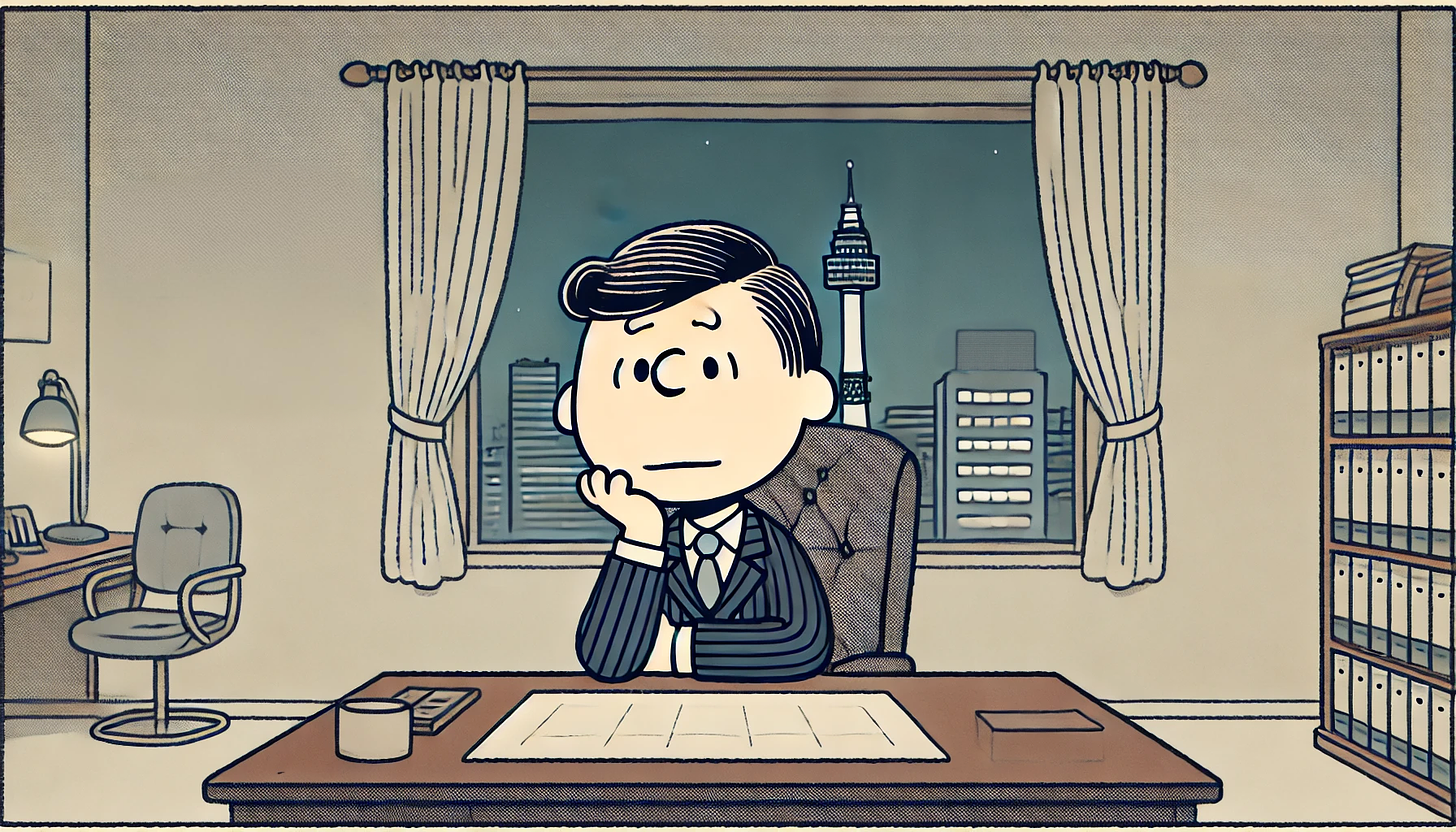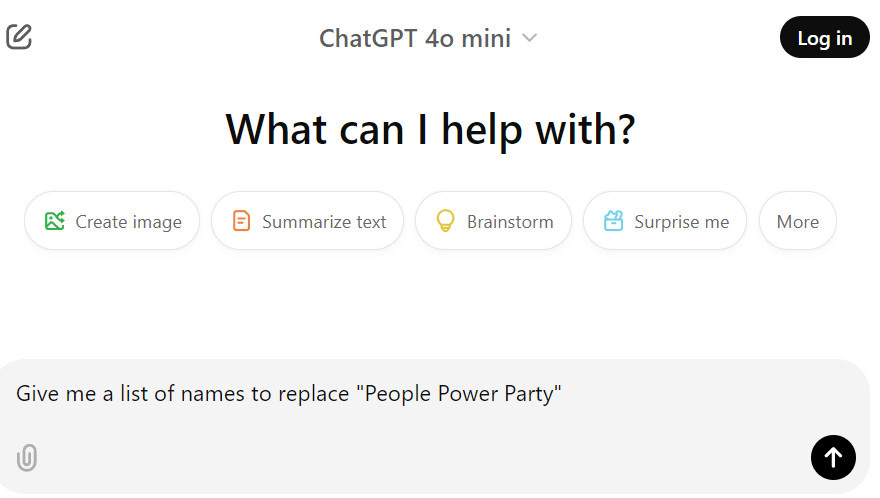South Korea’s conservative party needs a new name
After supporting a president-would-be-dictator-but-for-incompetence in an impeachment vote, a name change is coming.
South Korea’s conservatives like to change their party name after a f@*k up - and this time, they’ve really f@*ked up.
They refused to vote for the impeachment of a president who imposed martial law and wanted to seize control of the national assembly and arrest opposition leaders and journalists. Now they want to desperately hold on to power, so much that they’re throwing the country into constitutional crisis. The prime minister and party leader think they’re running the show but at the same time, the president is appointing ministers and going about business as usual. What we have is K-Confusion.
The public is really pissed. Nobody wants this - and soon the economy will start to feel the effects as general strikes spread and investors say WTF? I’m outta here! What confuses most people, is why the party leader would want this - he’s shooting himself in the foot. He will soon be as unpopular as Yoon.
As you can see, the party really f@*ked up. They desperately need your help.
Conservatives in South Korea believe the electorate has the memory of a goldfish. If the party name is different, maybe the public will forget about all the scandals, infighting, and unpopular policies. If you want to help the conservatives, start thinking of a new name. Looking at the conservative nomenclature gymnastics over the past two decades will help.
The Grand National Party (1997–2012)
Once upon a time, there was the Grand National Party (GNP), known in Korean as 한나라당. "Grand" was supposed to convey dignity, ambition, and stability. Unfortunately, the GNP’s brand became synonymous with corruption scandals, party infighting, and a knack for alienating the youth. By 2012, after several corruption debacles—remember the BBK stock manipulation scandal during Lee Myung-bak’s presidency?—the “Grand” had become a euphemism for “Grand Mess.”
So, what do you do when your reputation is in tatters? Rebrand, of course!
The Saenuri Party (2012–2017)
Cue the Saenuri Party (새누리당), which roughly translates to "New Frontier Party." Ah, the smell of fresh paint on the old walls! The Saenuri Party launched with promises of reform and clean governance. But, spoiler alert: the shiny new name couldn’t save them from their old habits.
The climax of the Saenuri era came with the impeachment of President Park Geun-hye in 2016–2017, a scandal so big it made global headlines. Bribes, cult leaders, and Rasputin-esque confidantes—Park’s presidency had it all. As millions of South Koreans filled the streets to demand her removal, the Saenuri Party’s approval ratings plummeted faster than you can say “Choi Soon-sil.”
Clearly, it was time for another name change. A phoenix rises from the ashes, right?
The Liberty Korea Party (2017–2020)
Enter the Liberty Korea Party (자유한국당). Nothing says “We’ve totally changed!” like slapping the word “liberty” in your name. But alas, the public wasn’t buying it. The party’s reputation for obstructionism, outdated social views, and resistance to progressive reforms earned it a new nickname: “The Party of No.”
By 2020, it became apparent that liberty wasn’t the magic word they were looking for. The conservatives decided it was time to shake the Etch A Sketch once more.
United Future Party (2020, for all of four months)
Briefly, like a cameo appearance in a long-running TV show, there was the United Future Party (미래통합당). Created to unify various conservative factions ahead of the 2020 legislative elections, the party went big on the rhetoric of "the future." The future, as it turns out, was a crushing defeat in the elections. Whoops. This four-month experiment was shorter-lived than some K-pop idol careers.
People Power Party (2020–present)
Finally, we arrive at the People Power Party (국민의힘). With a name like that, how could they lose? Surely, invoking “the people” and “power” would inspire trust, right? Well, no.
The PPP spent much of its time flip-flopping between ideological purges and desperate attempts to appeal to younger voters. It did have success and won the presidency in 2022 with Yoon Suk-yeol. But that last success was also the beginning of its end. The party has been dogged by controversies over conservative media manipulation, resistance to labor reforms, and the occasional diplomatic misstep—like acting as a lapdog to the U.S. and Japan.
But supporting a president-would-be-dictator but for incompetence in the 7 December impeachment vote, the party sealed its fate - a name change is coming.
What’s next?
So, what will it be this time? Luckily enough, I studied this some time ago. There are some patterns in the naming:
Themes of unity and renewal
Words like "Grand" (Grand National Party), "New" (Saenuri Party, United Future Party), and "United" (United Future Party) are recurring motifs. These choices seem designed to convey a sense of fresh beginnings and cohesion, often after periods of internal strife or public backlash.Appeals to tradition and patriotism
Names like "Liberty Korea Party" and "People Power Party" evoke patriotic and democratic ideals. By emphasizing “Korea” or “People,” the parties try to position themselves as the true defenders of national identity and public welfare.Focus on power and progress
Words like "Power" (People Power Party) and "Future" (United Future Party) reflect a desire to appear forward-looking and dynamic. These terms are often chosen in response to criticism that the conservatives are stuck in outdated policies or are too obstructionist.Euphemistic rebranding
Each name change conveniently coincides with a scandal or political defeat, suggesting a tactical use of rebranding to deflect public anger. By adopting names with positive connotations, the party tries to reset its image, even if the underlying structures remain the same.
Reflecting this, the new name will likely combine familiar themes of unity, renewal, and patriotism with a trendy buzzword meant to capture the spirit of the moment.
Two trends in modern society loom large - pastiche and simplification.
We’ve all seen retro or pastiche revivals in fashion, at the movies, and in music. Nobody can be bothered to invest in anything innovative and creative, so instead they turn to past successes and proven formulas and call it pastiche. In conservative party names, this would be going back to the earlier names, with terms such as "Liberty," "Grand National" or "Conservative".
We’ve also all experienced simplification, as we scroll through social media brands must be simplified so that your attention is immediately captured, like the widespread use of MAGA for Make America Great Again, or the use of YSL for the ubiqietous fashion brand. In conservative party names, this would mean finding combinations like “All Korea” or “Korea One.”
But as I’ve said before, it may be easier this time…
In the end, like many things in Korean politics, including the most recent coup attempt, everything comes down to one person’s idea.
So, there’s really no way to tell what the name will be until we see who takes the leadership spot after the coming spill - and if they continue to oppose impeachment, it won’t be too far away.





